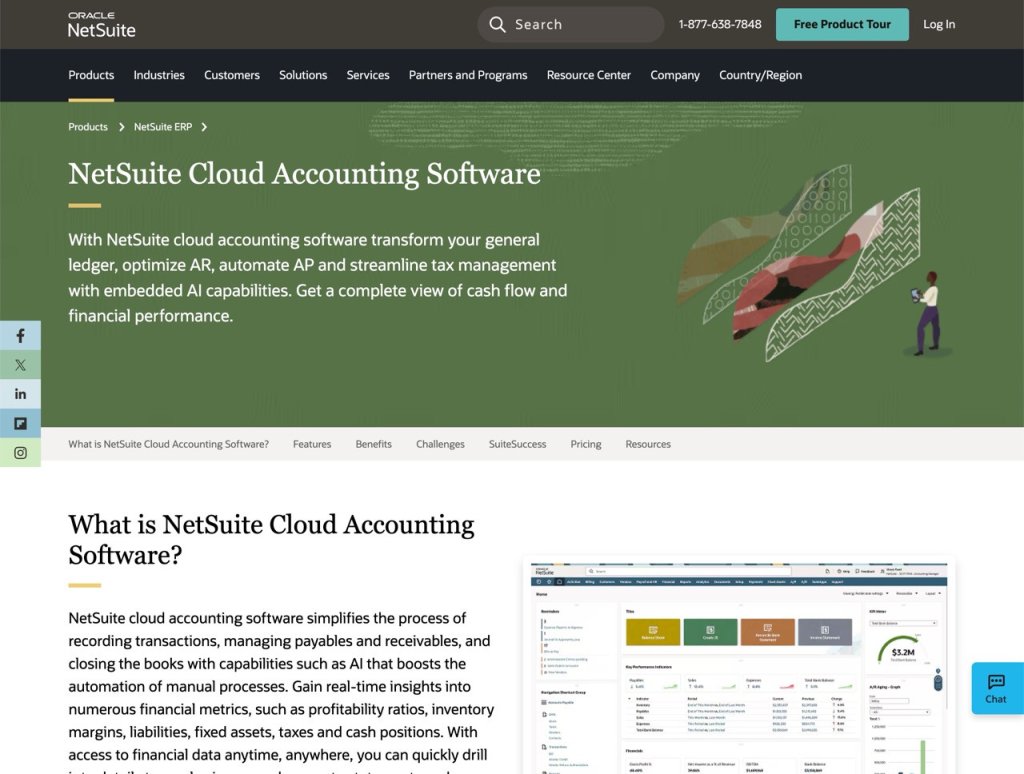It’s designed to support global businesses with multi-currency, multi-language, and multi-subsidiary capabilities, positioning it as a robust choice for companies with international operations or those anticipating rapid growth. While its accounting features are a core strength, NetSuite’s ERP functionality sets it apart, though this comes with added complexity and cost.
General Overview
Oracle NetSuite is a cloud-based enterprise resource planning (ERP) software that goes beyond traditional accounting to offer a comprehensive business management suite. Founded in 1998 by Evan Goldberg as NetSuite, it pioneered cloud-based business applications and was acquired by Oracle in 2016 for $9.3 billion, becoming a key part of Oracle’s portfolio.
Headquartered in Austin, Texas, NetSuite serves over 41,000 organizations worldwide as of 2025, catering to businesses of all sizes, though it’s particularly suited for mid-sized to large enterprises. Unlike simpler accounting tools like FreshBooks or Zoho Books, NetSuite integrates financial management with modules for CRM, inventory, supply chain, HR, and e-commerce, making it a one-stop solution for complex operations.
Pros and Cons
Pros
-
Comprehensive ERP Solution: NetSuite integrates accounting with CRM, inventory, HR, and e-commerce, providing a unified platform for managing all business operations, ideal for companies with complex needs.
-
Scalability: The software grows with your business, supporting multi-subsidiary operations, global currencies (over 190), and industry-specific solutions for sectors like manufacturing, retail, and nonprofits.
-
Advanced Reporting: NetSuite offers robust financial reporting and real-time dashboards, allowing businesses to monitor key performance indicators (KPIs) and make data-driven decisions.
-
Automation and AI: AI-driven automation streamlines tasks like account reconciliation, invoicing, and tax calculations, reducing manual errors and improving efficiency.
Cons
- High Cost: NetSuite’s pricing is custom and often expensive, with a reported base license fee of $999/month plus $99/month per user, plus implementation fees, making it less accessible for small businesses.
- Steep Learning Curve: The platform’s complexity can be overwhelming for new users, often requiring a consultant or extensive training to fully utilize its features.
- No Free Trial: Unlike competitors like Xero or FreshBooks, NetSuite doesn’t offer a free trial, though a free product tour is available, which may deter businesses wanting to test before committing.
- Implementation Challenges: Setup can take months and be costly, with some users reporting delays and the need for technical expertise to customize the system.
Usability and Setup
Oracle NetSuite’s usability reflects its enterprise-grade design, prioritizing functionality over simplicity. The setup process begins with a consultation, as pricing and implementation are tailored to each business’s needs. This involves selecting modules, defining user roles, and configuring the system, which can take several months and often requires a consultant, especially for complex operations.
The dashboard is highly customizable, displaying real-time KPIs like cash flow, revenue, and inventory levels, but it’s packed with tools and drop-down menus, which can feel cluttered compared to simpler platforms like FreshBooks. Navigation relies on a role-based interface, meaning users see only the features relevant to their roles, which helps but doesn’t fully offset the learning curve.
NetSuite offers interactive guides and role-specific training resources, including educational certificates for roles like developers or analysts, to ease onboarding. The mobile app provides access to dashboards, reports, and basic tasks like expense tracking, but user reviews note it’s not as robust as the desktop version, with some functionality missing.
Overall, while NetSuite is powerful, its complexity makes it less intuitive than competitors, requiring a significant time investment to master.

Pricing and Plans
Oracle NetSuite uses a custom pricing model, meaning costs vary based on the number of users, selected modules, and implementation needs. As of April 2025, there’s no transparent pricing on the website, but user reports and industry insights suggest a base license fee of $999/month, plus $99/month per user.
Implementation fees, which cover setup and customization, can range from $10,000 to $100,000 depending on complexity, and additional costs may apply for premium support or add-ons. NetSuite offers three main plans with core functionalities, though specifics aren’t publicly detailed:
| Plan | Price/Month | Users | Key Features |
|---|---|---|---|
| Base | $999 + $99/user | Custom | Core ERP, financial management, basic CRM, inventory, order management |
| Mid-Tier | Custom | Custom | All Base features, plus advanced reporting, multi-currency, global operations |
| Enterprise | Custom | Custom | All Mid-Tier features, plus industry-specific solutions, advanced analytics |
Main Features and Integrations
Oracle NetSuite provides a comprehensive suite of features, extending far beyond traditional accounting to encompass full ERP functionality. Here’s an in-depth look at its capabilities:
Financial Management: NetSuite’s accounting module includes a dynamic general ledger, accounts payable/receivable, fixed asset management, and cash management. It automates transaction posting, calculates sales tax across over 50 countries, and ensures compliance with standards like GAAP, ASC 606, and SOX.
Invoicing and Billing: The platform supports recurring invoices, automated payment reminders, and online payments via integrations like Stripe and PayPal (transaction fees apply). It also handles revenue recognition and billing for subscriptions or projects.
Bank Reconciliation: NetSuite automates reconciliation for bank accounts, credit cards, and intercompany transactions, with balance comparisons and sign-off tracking to ensure accuracy.
Inventory Management: A key strength, NetSuite tracks stock levels, orders, and deliveries in real time, with features for warehouse management, dropshipping, and multi-location inventory, ideal for retail or distribution businesses.
Order Management: The system streamlines order processing from entry to fulfillment, integrating with inventory and financials to prevent errors and improve efficiency.
Financial Reporting: NetSuite offers over 100 prebuilt reports, including income statements, balance sheets, and cash flow statements. Customizable dashboards provide real-time insights into KPIs, with advanced analytics in higher plans.
Multi-Currency and Global Operations: Supporting over 190 currencies and 27 languages, NetSuite handles multi-subsidiary management, exchange rates, and global tax compliance, making it ideal for international businesses.
Automation and AI: AI-driven features automate tasks like account reconciliation, tax calculations, and financial forecasting, reducing manual work and errors.
CRM Module: NetSuite includes CRM tools for sales automation, marketing campaigns, customer support, and partner management, providing a 360-degree view of the customer journey.
Mobile App: The mobile app allows access to dashboards, reports, and basic tasks like expense tracking, but it’s less feature-rich than the desktop version, with mixed user reviews on performance.
Security: NetSuite uses 256-bit SSL encryption, two-factor authentication, role-based access controls, and regular backups to ensure data security and compliance.
Integrations
NetSuite integrates with a wide range of third-party apps, though its strength lies in its native modules. Key integrations include:
Payment Processors: Stripe, PayPal, and Bill.com for online payments.
Productivity: Microsoft 365, Google Drive, and Dropbox for reporting and file sharing.
CRM: Salesforce for enhanced customer relationship management.
Financial Tools: Cube and Jirav for advanced financial planning.
A detailed plan comparison highlights the feature set across NetSuite’s offerings, though specifics vary by customization:
| Plan | Base | Mid-Tier | Enterprise |
|---|---|---|---|
| Price/Month | $999 + $99/user | Custom | Custom |
| Users | Custom | Custom | Custom |
| Financial Management | ✓ | ✓ | ✓ |
| Inventory Management | ✓ | ✓ | ✓ |
| Order Management | ✓ | ✓ | ✓ |
| Basic CRM | ✓ | ✓ | ✓ |
| Multi-Currency | ✕ | ✓ | ✓ |
| Advanced Reporting | ✕ | ✓ | ✓ |
| Industry-Specific Solutions | ✕ | ✕ | ✓ |
| Advanced Analytics | ✕ | ✕ | ✓ |
Support Options
Oracle NetSuite provides extensive support options, though availability and quality vary by plan. All plans include 24/7 support for critical issues via phone, email, and live chat, with higher-tier plans offering 24/7 support for non-critical issues and dedicated account managers.
The support team is generally well-regarded, with users noting responsive and professional assistance, though some report challenges with complex issues.
NetSuite also offers a wealth of self-help resources, including a help center with articles, video tutorials, webinars, and a community forum (NetSuite Customer Community) for peer support. Interactive guides and role-specific training, including educational certificates, help users learn the platform.
However, support comes at an additional cost, with four different packages available, and some users have reported long resolution times for technical issues. For businesses new to ERP, the learning curve and support costs may necessitate hiring a consultant, especially during implementation.
Conclusion
Oracle NetSuite is a powerhouse for mid-sized to large enterprises needing a comprehensive ERP solution that integrates accounting with broader business management. Its advanced financial management, inventory tracking, and global capabilities make it ideal for complex operations in industries like manufacturing, retail, and distribution.
The platform’s scalability, AI-driven automation, and robust reporting provide significant value for businesses with international or multi-subsidiary needs, outshining simpler tools like FreshBooks or Zoho Books in depth and flexibility. However, its high cost—starting at $999/month plus $99/user, plus implementation fees—makes it less accessible for small businesses or startups, and the lack of a free trial may deter those wanting to test before committing.
The steep learning curve and complex setup also mean it’s not the best fit for businesses seeking simplicity or quick deployment, where alternatives like Xero or Sage 50cloud might be more appropriate.
For companies ready to invest in a scalable, all-in-one solution and willing to navigate its complexity, NetSuite is a top-tier choice, making it a valuable addition for your company with enterprise-level needs.


